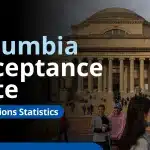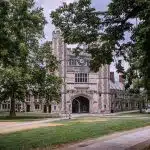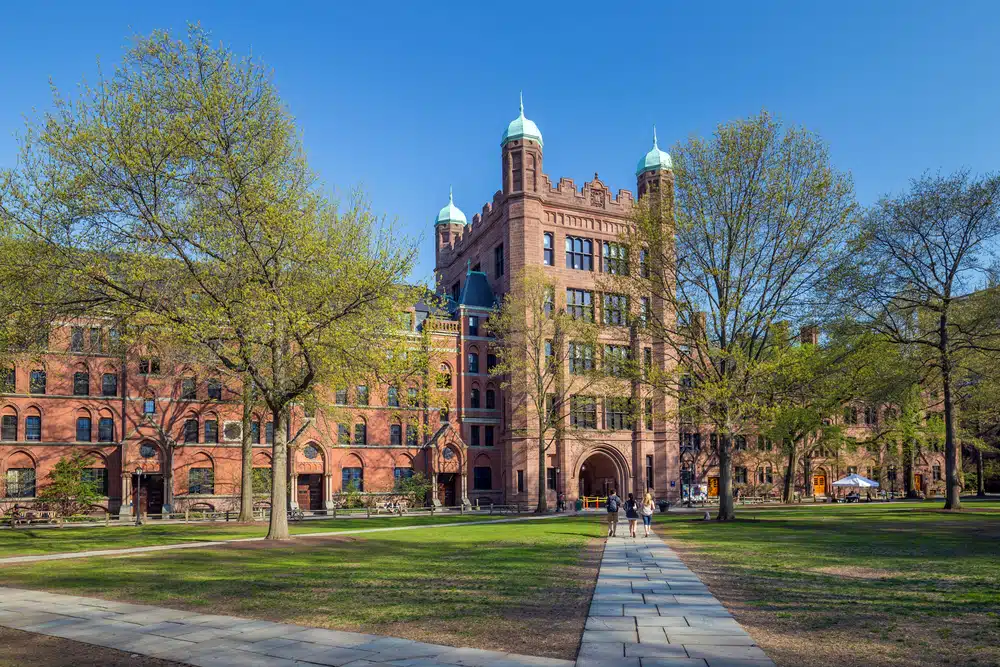Harvard University vs Harvard College: many people mistake these two as separate institutions. This misconception may be because of the different academic focuses and degree levels associated with each of them. So is Harvard College the same as Harvard University? It’s actually not as simple as that.
In this article, we’ll have an in-depth discussion of Harvard University and Harvard College, including their similarities and differences.
- Is Harvard College the Same as Harvard University?
- Differences between Harvard College and Harvard University
- Similarities between Harvard College and Harvard University
- Frequently Asked Questions
- Takeaways
Is Harvard College the Same as Harvard University?
No, Harvard College isn’t really the same as Harvard University. Instead, Harvard University is the umbrella organization that includes Harvard College. In short, Harvard University represents the whole institution, while Harvard College is just one part of it.
Harvard College focuses exclusively on providing a liberal arts and sciences education to undergraduate students pursuing bachelor’s degrees. On the other hand, Harvard University includes graduate and professional schools that offer advanced degrees in fields like law, medicine, and business.
The two are closely connected and share resources, but the terms “Harvard College” and “Harvard University” also point to distinct aspects of the same institution by catering to different academic and career goals.
We’ll give a quick profile of both Harvard University and Harvard College below.
What is Harvard College?
Harvard College is the undergraduate liberal arts and sciences college of Harvard University.
As an undergraduate, you can choose from a wide range of subjects through a core curriculum and elective courses. This is because the college aims to produce graduates who can help change the world by making them understand that problems can be multidisciplinary—and, in effect, can be solved by looking at them from different sides.
Harvard College is “committed to helping students undergo an intellectual, social, and personal transformation far beyond the traditional college experience.” Aside from academics, you can also be part of groundbreaking research and participate in student organizations.
What is Harvard University?
Harvard University comprises several schools, which includes Harvard College. These different schools have their own unique focus and mission, but overall, they make up a hub for research and innovation that contributes to advancements in science, technology, and the arts.
Schools under Harvard University include:
- Faculty of Arts and Sciences. Harvard’s Faculty of Arts and Sciences is made up of the four schools below.
- Harvard College. This provides a four-year liberal arts and sciences education to students pursuing bachelor’s degrees.
- John A. Paulson School of Engineering and Applied Sciences (SEAS). This school mainly uses engineering and foundational science in solving current issues.
- Kenneth C. Griffin Graduate School of Arts and Sciences (GSAS). This is the largest graduate school at Harvard University, offering graduate studies in around 58 disciplines.
- Harvard Extension School. The Extension School is Harvard made more accessible, flexible, and affordable. It offers academic pathways that align with your schedule, budget, and learning needs.
- Harvard Business School (HBS). HBS aims to produce graduates who will make a difference in business and management practices worldwide.
- Harvard School of Dental Medicine (HSDM). HSDM students learn that oral health is also interdependent on systemic health, allowing them to improve the well-being of their patients.
- Harvard Graduate School of Design (GSD). This school educates its students in making a resilient, just, and beautiful world through their design and research.
- Harvard Divinity School (HDS). HDS helps students create a better world by becoming great leaders in religious, governmental, and service organizations.
- Harvard Graduate School of Education (GSE). GSE graduates are expected to be leaders in the education sector who will be at the forefront of expanding opportunities and improving outcomes for learners everywhere.
- Harvard Kennedy School (HKS). HKS teaches students to improve public policy and leadership to create better societies for everyone.
- Harvard Law School (HLS). The school offers hundreds of courses, seminars, clinics, and student practice orgs that can help students reach the highest ideals of law and justice.
- Harvard Medical School (HMS). HMS students hope to improve health and well-being through their dedication to medical education, research, and clinical care
- Harvard T.H. Chan School of Public Health (HSPH). The school works to produce graduates who improve health and promote equity so communities everywhere can thrive.
- Radcliffe Institute for Advanced Study. This institute promotes interdisciplinary research and exploration to support the development of Harvard students and engage a wider audience.
Because of the many schools that Harvard University houses, it’s no surprise that the graduate population is higher than the number of undergraduates, with 9,579 undergrads and 21,263 graduate students.
Differences between Harvard College and Harvard University
The table gives a quick view of the differences between Harvard College and Harvard University:
| Factors | Harvard College | Harvard University |
| Scope and structure | Undergraduate college of Harvard University | Made up of different schools and institutes catering to undergraduates, graduate students, and professionals |
| Programs offered | Exclusively undergraduate education with a liberal arts and sciences curriculum that encourages broad intellectual exploration | Includes graduate and professional schools with specialized programs leading to master’s, doctoral, and professional degrees |
| Student demographics | High school graduates | Applicants with prior undergraduate degrees and specialized career aspirations |
| Student experience | Strong sense of community through clubs, sports, and events tailored to their age group and educational focus | Focused on research, internships, or professional training |
We’ll talk more about other differences between Harvard College and Harvard University below:
Application process
The application process for Harvard College is targeted towards high school students, requiring the following:
- Common or Coalition Application
- High school transcript
- SAT and ACT scores (although other tests scores like AP exam results or GCSE/A-Level Actual or Predicted Results may be accepted in exceptional cases)
- Teacher recommendations
- Personal essays
Meanwhile, Harvard University’s admissions process differs by school and program. However, they generally already require specialized qualifications and professional experience.
For instance, one of the requirements for application for the HBS MBA program is a resume. That’s because the curriculum is designed for applicants who already have at least two years’ worth of full-time work experience.
Another example: Harvard Medical School has a list of prerequisite courses that applicants should have before the application cycle.
Academic offerings
Harvard College focuses on a foundational education in the liberal arts and sciences. They aim to give undergraduates a space for broad intellectual exploration.
However, aside from bachelor’s degrees, the school has other academic offerings that cater to its students’ many interests as well:
- General Education Program. Harvard College’s general education curriculum requires students to take courses outside their primary field of study to give them a well-rounded intellectual foundation.
- Secondary fields (minors). Students can pursue secondary fields to complement their concentrations.
- Research opportunities. The school encourages undergraduate research across disciplines. They offer funding, mentorship, and access to state-of-the-art facilities.
- Special academic programs. These allow students to have joint concentrations, cross-register with other schools, and get dual degree programs (such as with Berklee College of Music). This also lets students study abroad for more experiential learning opportunities.
Meanwhile, the academic programs of Harvard University include graduate and professional programs for advanced and specialized study. These programs offer professional, technical, and research-oriented training for a more in-depth and career-specific education.
Graduate students can also engage in interdisciplinary programs, combining fields such as law and public health.
Other programs, such as those offered by the Harvard Extension School, also allow for professional development and lifelong learning opportunities for those who need more flexibility in terms of time and budget. Microcertificates, such as Circular Economics and Project Management Methodologies are highly focused on a skill set and only take 2 courses to complete.
Career opportunities and alumni networks
Harvard has a centralized hub of careers and networking resources for all its alumni.
You might notice that graduate and professional schools in Harvard University have their own career networking offices and resources outside of the Office of Career Services. These schools also have their own LinkedIn groups, webinars, and curated job boards.
Meanwhile, Harvard College graduates have a more general alumni network on LinkedIn and a professional development toolkit that can help fresh grads start their careers.
Similarities between Harvard College and Harvard University
Despite the differences, they both have some similarities, given that Harvard College is under Harvard University.
Shared resources
The Harvard campus is huge, spanning about 5,667 acres to include all of its schools and facilities.
Here, both undergraduate and graduate students alike share several resources:
- Libraries. The Harvard University Library is one of the largest and most comprehensive academic library systems in the world, with at least 20 million volumes, 400 million manuscripts, 10 million photographs, and one million maps across multiple libraries.
- Research facilities. Laboratories, research centers, and institutes are open to both undergraduate and graduate students.
- Extracurricular opportunities. All Harvard University students can participate in university-wide clubs, organizations, and initiatives—such as student government, art performances, and cultural groups.
- Campus infrastructure. The Harvard community shares facilities like gyms, athletic fields, dining halls, and health services. Some accommodations even house both graduate and undergraduate students under the same roof.
- Events and lectures. University-wide lectures, conferences, and symposiums feature prominent speakers and scholars.
Reputation
Both Harvard University and Harvard College have impressive academic reputations. In fact, Harvard University ranked number 1 in the World Reputation Rankings 2023 and number 4 in the QS World University Rankings 2025.
Meanwhile, Harvard College also ranks in various undergraduate programs nationally, such as:
- #2 in Psychology
- #5 in Economics
- #7 in Undergraduate Research/Creative Projects
- #9 in Data Analytics/Science
- #27 in Best Undergraduate Engineering Programs
Frequently Asked Questions
1. Can Harvard College students attend other Harvard University schools?
Yes, Harvard College students can attend certain courses or programs offered by other schools within Harvard University (and vice versa), but the opportunities are specific. Students can cross-register as long as courses are open to them, but this is still subject to approval by the involved schools.
Some Harvard University schools also offer special pathways that let Harvard College students take graduate-level courses as part of joint or accelerated degree options.
2. Which is harder to get into: Harvard College or other schools in Harvard University?
All the schools within Harvard University, including Harvard College, are very competitive. Harvard College is harder to get into in terms of raw acceptance rates and the sheer number of applicants, resulting in an acceptance rate of 3.6%.
Other schools in Harvard University cater to applicants with specific qualifications. However, the process is still highly selective and challenging even for candidates in their respective fields. For instance, HMS has an acceptance rate of 3.2% for entering students in 2024.
3. Was Harvard the first college?
Founded on October 28, 1636, Harvard was the first college in the American colonies. However, despite popular belief, John Harvard did not found the school. Instead, he was the first major benefactor, donating his library and half his estate.
4. When did Harvard change its name?
The school was named Harvard College on March 13, 1639, in honor of John Harvard after his donation to the school.
5. When did Harvard College become Harvard University?
Harvard became a university in 1780 when the Massachusetts Constitution went into effect. The Medical School was founded in 1782, making Harvard a university in fact as well as name.
Takeaways
There are some differences and similarities between Harvard University and Harvard College. The basic answer is that Harvard University is the main organization that houses multiple schools and institutions—which includes Harvard College. Below are a few other things to remember when comparing the two:
- Harvard College is open to high school students who want to pursue undergraduate degrees. Other Harvard University schools cater to those who want to pursue master’s, doctorate, or professional degrees.
- The student experience at Harvard College is more holistic, with a tight-knit undergraduate community that bonds through clubs, sports, and events. Students in other Harvard University schools are generally more focused on their research or professional training.
- Harvard College provides students with a liberal arts and sciences curriculum, requiring them to take courses outside their concentration for a more well-rounded education.
- Meanwhile, other Harvard schools offer a more in-depth and specialized education according to their field.
- Interested in getting into Harvard College and possibly other Harvard schools later on? A college admissions consultant can give you personalized guidance on improving your academics and extracurriculars to help you get accepted.




















